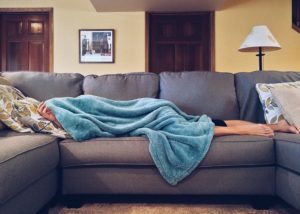
For most, the long-awaited summer holidays have ended, and it is back to work as usual. Unfortunately, for some, the holiday period did not provide the break that was desperately needed, and many are still feeling exhausted, tired, and burnt out.
According to Radio New Zealand, the summer holidays period for many was marked with COVID-19 infections. It is estimated that in the week leading up to Christmas Day, 32,000 people tested positive for COVID-19.[1]
Not only did they have to miss out on Christmas celebrations with family and friends, but many have also been left feeling more tired and exhausted than they were before they went on holiday. We all know how awful COVID-19 symptoms can be and for those who contracted the virus over the holiday period, it would have been no different.
Sick leave during annual holidays
Under the Holidays Act 2003, if an employee (or their spouse, partner or dependent) falls sick during their annual holidays, the employer may allow the employee to take sick leave and use their annual leave on another date.
If an employee (or their spouse, partner or dependent) gets sick before starting their scheduled annual holidays, the employer must allow the employee to take the period of annual leave as sick leave up to the amount of sick leave that the employee has available to them.
It is important to note that an employer is entitled to ask an employee for proof that they are sick, before allowing the employee to swap out their annual leave for sick leave.

Why should more employers consider allowing employees to swap out annual leave for sick leave when required?
Annual leave is not only important for employees, but also important for employers. There is no doubt that taking annual leave reduces work stress and burnout among employees. Studies show that after a holiday, employees are less stressed and can manage work responsibilities more efficiently.[2]
It is unlikely that an employee who spends their annual leave (a period which is intended to be for relaxation and rest) being sick, will return to work feeling refreshed and re-energised. Further, an employee who returns to work feeling more tired and exhausted is likely to be less productive and efficient at work and at risk of burn out which could lead to extended periods of time out of the office.
While employers are eager to put COVID-19 behind them and make the most of 2023, we must accept that the virus is a part of our new reality. Employers may start seeing more and more requests from employees to swap their annual leave out for sick leave as the virus evolves into new subvariants, and many continue to fall sick. We encourage employers to consider allowing employees to swap their annual leave for sick leave as it would ensure that employees are able to use their annual leave when they really need it.
Get in touch with the team at Black Door Law for tailored advice on sick leave or annual leave.
Disclaimer: This information is intended as general legal information and does not constitute legal advice. If you have a specific issue and wish to discuss it get in contact with the Black Door Law team
[1] https://www.rnz.co.nz/news/national/482107/the-summer-holidays-are-over-but-did-you-get-a-break-or-covid-19
[2] https://www.linkedin.com/pulse/why-annual-leave-so-important-isha-ranjan/.